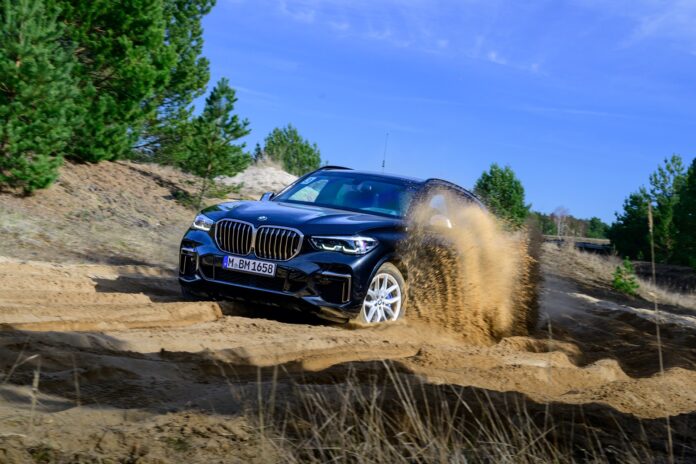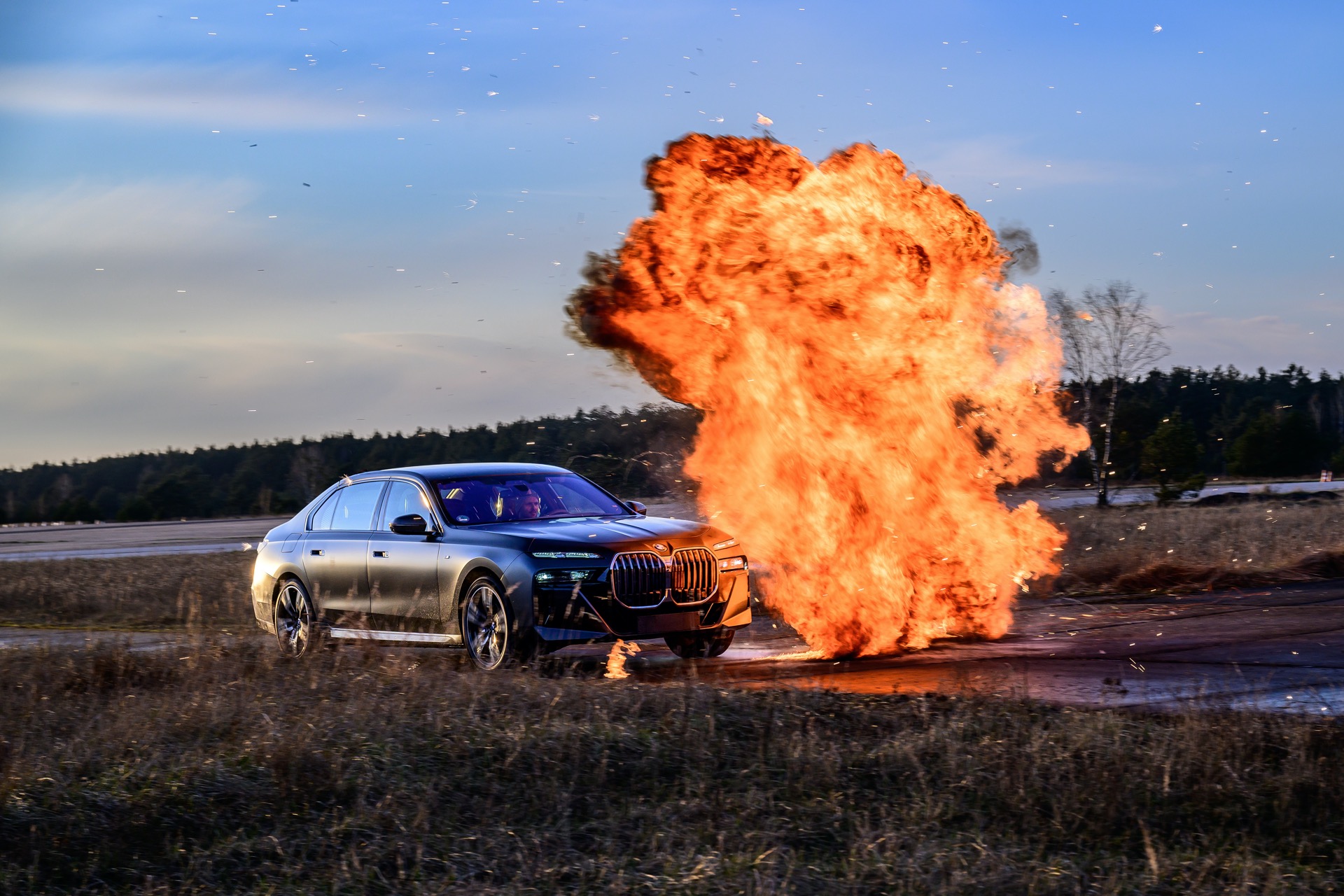The demand for armoured cars is growing and growing. Even though terror against politicians and business leaders in Europe has taken a back seat, armoured vehicles are still a sought-after commodity. But the armoured car itself is only half the solution, because without specially trained bodyguards they are virtually ineffective. We took exclusively part in such a personal protection training.
The explosion in the small, gloomy alleyway comes out of the blue. There is a loud bang to the left of the heavily armoured BMW 7 Series – fireball included. The driver hits the accelerator in a fraction of a second and thunders into the adjacent woodland. The guarded person in the back, called Princess, is unharmed. The two bodyguards in the front are visibly relieved after the test. Just another test – as has been the case for two days in the BMW personal protection training program. But instructor Reinhard Endreß hardly has a good word to say about the supposedly successful mission: “The bodyguards in the car were not frightened by the explosion, but they accelerated at high speed to get out of the danger zone,” the former police officer is emphatically serious, “but after an explosion like this, the road is destroyed in reality. Driving on or accelerating forwards doesn’t work. Full braking and then full throttle back – that would have been the right solution.” The course participants are now paler than when the explosion occurred.
Several times a year, BMW is one of the few companies to offer professional personal protection training. The list of participants is as secret as it is elitist, so lips are sealed when it comes to names and designations. It is no secret that state and federal special forces regularly train their operational practices here. The other customers are drivers for top politicians, ministries, ambassadors, royalty or large corporations. Their drivers are also bodyguards who have to ensure that the person they are protecting gets through traffic safely every day and that any attacks from outside can be fended off. Dangers lurk everywhere – every day – every night – on every journey – however short or recurring the daily routine may be. We are talking about vehicles being shot at with precision rifles, grenades, drones or even bombs. It can happen anywhere: Berlin, Beirut, Madrid or Sao Paulo.
The training courses themselves take place away from the public at remote airfields or military training areas. “We offer these training courses not only in Germany,” explains Dieter Schöner, one of the trainers responsible, who also worked for decades in various roles in the police, “but of course we also offer such training courses for customers abroad.” The programs themselves have little to do with normal driver training, which is all about vehicle control at the limits, as the numerous exercises during the day and at night are carried out in armoured vehicles such as a BMW X5 VR6 or the new BMW i7 / 760i Protection. High-ranking politicians, business leaders or even special police units are on the road in such heavily secured models. Visually, the models are difficult to recognise, as it is only at third glance that the black frames of the centimetre-thick windows or the special tires, which allow the vehicles to get out of the danger zone even with shredded tires, become apparent.
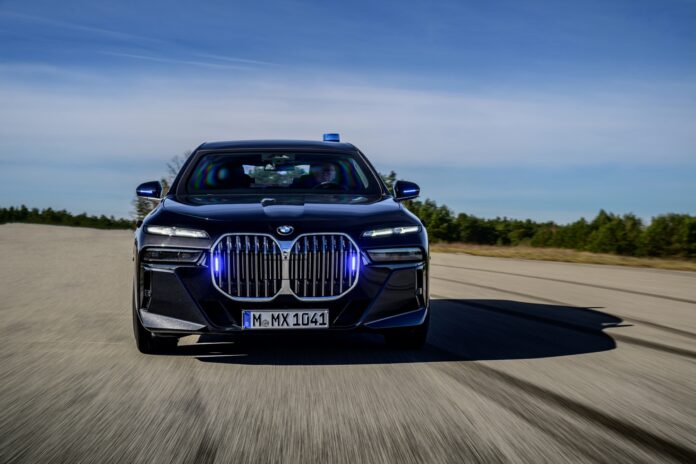
While the armoured BMW X5 can be driven almost like a normal SUV in everyday life despite its extra weight of over 800 kilograms, the new BMW i7 xDrive60 Protection is a completely different story. The luxury saloon, which is classified according to protection class VR 9/10, is the first of its kind in the world to be equipped with an electric drive. 400 kW / 544 hp provide brisk propulsion despite the 4.5-ton unladen weight – up to a top speed of 160 km/h. The sister model with its 530 hp V8 combustion engine is more suitable for long-distance tours – it can easily reach 210 km/h for fast passages in the blue light protection column.
However, the next exercises are not about top speed, but about controlling the black behemoths. At 60 and then 70 mph, we enter a narrow passing lane – barely wider than the car itself. Full braking, swerving, counter-steering – again and again. Reinhard Endreß is more satisfied with his students this time. “Precise and fast steering – great. And stay fully on the brakes – that’s right,” the experienced instructor radios into the car. Over the past 23 years, he has made hundreds of participants fit for the dangerous tasks of everyday life. “It’s easiest to work with the special units,” says the Bavarian, “they know exactly what it’s all about, listen attentively and know their limits. This is where we as trainers benefit from our stable smell and these participants absorb the content differently.”
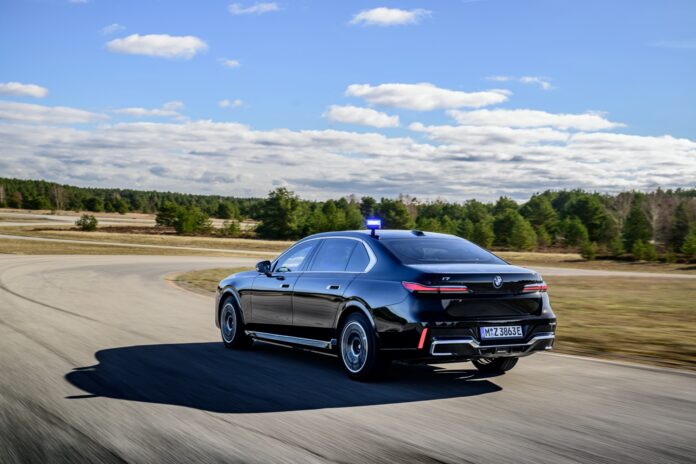
Tomorrow, the next international special forces will arrive to get up to speed once again in terms of vehicle control at the wheel of the BMW X5 and BMW 7 Series. “The teams also train some things among themselves, because this is about secret tactics of access or escape manoeuvres,” explains Dieter Schöner, “so of course we are left out.” The other exercises are all about repetition – the black armoured limousines thunder down the former runway again and again – testing the limits. Braking, swerving and full throttle backwards. The whole thing is also available as a night program with and without headlights switched on.
Again and again, the participants encounter unexpected surprises to put them under pressure – to build up stress. Stun grenades are set off as they enter the evasive lane or the armoured windows of the protection vehicles are shot at with paint guns – everything creates stress and distraction when every second counts and the protection person has to be brought out of the danger zone. None of the bodyguards should be afraid for their equipment.
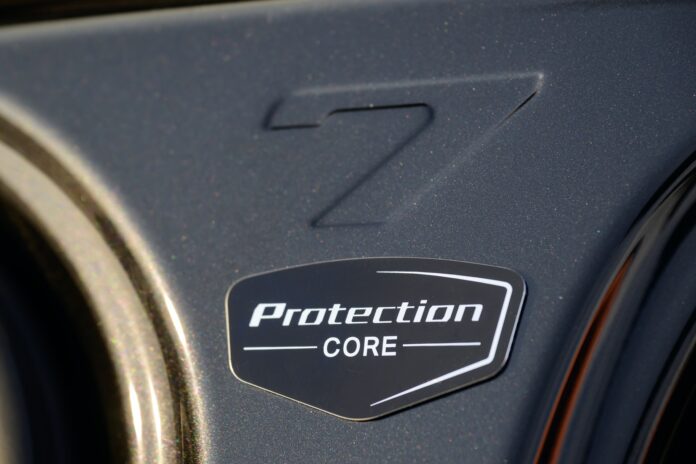
However, even professionals have to overcome some mental hurdles. In between, they switch to older armoured vehicles and the gap between the wedged vehicle and the crash barrier is narrower than the escape vehicle itself. Nevertheless, its full throttle through the narrow passage – it crashes and rattles – but the escape succeeds – including a dented front end.
The whole thing is also available as a night program with and without headlights switched on. Again and again, the participants encounter unexpected surprises to put them under pressure – to build up stress. Stun grenades are set off as they enter the evasive lane or the armoured windows of the protection vehicles are shot at with paint guns – everything creates stress and distraction when every second counts and the protection person has to be brought out of the danger zone. None of the bodyguards should be afraid for their equipment. However, even professionals have to overcome some mental hurdles. In between, they switch to older armoured vehicles and the gap between the wedged vehicle and the crash barrier is narrower than the escape vehicle itself. Nevertheless, they drive through the bottleneck at full throttle – it crashes and rattles – but the escape is successful – including a dented front end.
